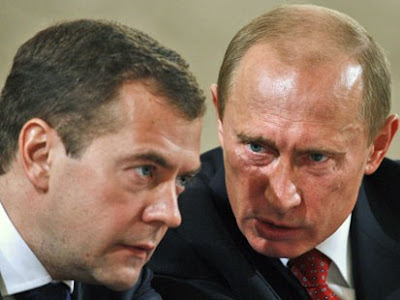
Making the Right Choice in Russia
by Yuri Zarakhovich
In 2004, Russian President Vladimir Putin scrapped the election of regional governors by popular vote and introduced a system which was painfully reminiscent of the Soviet past i.e. – the Communist Party’s Central Committee would “recommend” Comrade X as a Region’s Party Leader. The Regional Party Committee then unanimously voted to elect Comrade X their First Secretary.
That was Soviet democracy, best summed up in a popular joke of that era: “There is an opinion…” intoned the First Secretary; “There are no objections,” replied the Committee.
Under The Putin system, the Kremlin “recommends” the governor—and bingo—the regional legislature “elects” him.
Many liberal tears, both in the East and the West, were shed over Russian President Dmitri Medvedev’s December 2008 bill to allow the parties who win regional elections to nominate governors to be elected by regional legislatures.
The Duma, where three parties are represented in addition to the ruling United Russia, rubber stamped Medvedev’s bill into law obligingly. In return they expected their compliance to bring them at least one or two regional governorships, the offices of which are fat in monetary and political payoffs. No such luck.
According to official results, Putin’s United Russia party carried last Sunday’s regional and local elections in a landslide victory. According to massive evidence, the party carried the elections by blatant and open fraud. (Kommersant, October 15).
The enraged Communist Party, Kremlin’s old stooge Vladimir Zhirinovsky’s Liberal –Democratic Party and Putin’s loyalist-cum-opposition to the Kremlin Just Russia, staged a demonstrative walkout of the Duma session to record their protest. They also demanded a meeting with Medvedev.
The closet liberal President, however, chose to snub them. His spokesperson Natalya Timakova told the press that Medvedev’s views had not changed from Monday when he hailed United Russia’s victory as showing the party had a “legal and moral right” to run the regions.
The “rebellious” parties quickly chose to return to the parliament’s floor. So what else is new? The way it has been handled over previous decades, “opposition” parties’ leaders will bargain their private pounds of flesh. Medvedev will condescend to meet with them at some point—and sugar-coat the issues publicly by allowing them to contest street janitors jobs, or other vacancies left by the Putin party.
So, what is the punch line here? The Russian President can assuredly get away with any political promise. Why shouldn’t he promise his loyal “opposition parties” to nominate their governors should they win? The point is he knows he won’t let them win—so why the hell not? Liberals, both domestic and foreign, will be placated, though.
As for the rest of the country, Soviet humor applies again:
“Do you know when the precedent of individual free choice in elections was set?”
“No, but do tell!”
“Why, it’s all in the Bible! God brought Eve to Adam and commanded: ‘Choose!’”




